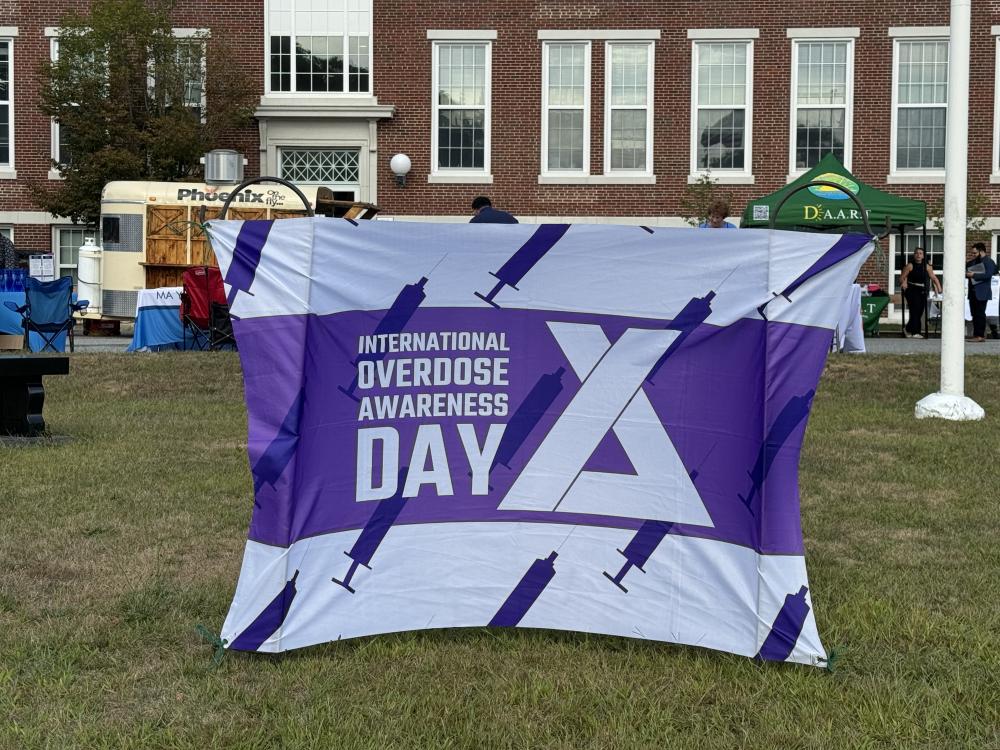‘One Big Family’ at Overdose Awareness Day
Since 2024, there have been 24 overdoses in Dartmouth, three of which were fatal.
Community members came together Thursday night at Dartmouth Town Hall for the town’s third annual Overdose Awareness Day event.
The event, hosted by Dartmouth Advocates for Addiction, Recovery, and Treatment, featured speakers whose lives have been affected by addiction and overdose. The theme was “One Big Family.”
Attendees visited booths for local support networks such as the New Bedford Health Department, TRAIN, which is Teach Reach And Initiate Narcan, Dartmouth Council on Aging and more.
Booths offered free necessities such as narcan kits and drug deactivation kits, which allows a user to place pills in the bag and fill with water to dissolve them. People could also plant wildflowers to bring home in remembrance of someone who has overdosed.
Child and Family Services were there with Massachusetts first and only mobile recovery van, which offers 24/7 crisis intervention for issues including behavioral health, confidential care and immediate support.
“The impact of overdose extends far beyond the individual,” said Heidi Silva-Brooks, the chair of the Dartmouth Advocates and Select Board, “It sends shock waves through the networks of our town and leaves a residual battle of grief that we face everyday.”
The theme of family was evident with the speakers all of whom cited family, both found and blood, as a part of their recovery journey.
New Bedford representative Christopher Hendricks shared his own experience in addiction, and how the community he found in rehabilitation programs helped him recover.
William Hawkes shared his journey beginning with surgery at 16, and fell back into addiction when he was injured and prescribed the same heavy pain medications. He felt he could not have escaped addiction if his mother did not escape her own. Her recovery forced him to seek recovery, and now he has a family of his own. He is now in school for recovery, and helps people for a living and works with first responders.
“Those are the extreme blessings of getting sober and being in recovery,” said Hawkes, “It all just kind of works out.”
Meagan Lincoln also shared her experience having a mother with an addiction. She remembers how amazing a woman her mother was from her love of animals and green thumb to the fact that the local sex workers knew that her house was a safe place to sleep.
When her sister called her to tell her their mother had died, Lincoln knew the reason without having to be told. While Lincoln was in active addiction, she prayed for the life she has today. She works with Child and Family Services to help others.
“If any of you here are struggling or know somebody who is struggling,” said Lincoln, “Please come ask for help. Because you deserve it.”
On her death bed, Nelson Hughes’ mother asked him to promise to stay in recovery. He has now been clean for 35 years. He grew up in a rough neighborhood, surrounded by gang violence. His cousin died in a fire due to being intoxicated on drugs. He lost his best friend to suicide after a relapse. He now speaks at events for those who cannot, those who are sick and suffering.
“They told me if you look down on somebody,” said Hughes, “One day you may have to look up to them.”
Attorney General Andrea Campbell, who recently moved to Dartmouth, shared her story growing up with her mother dying when she was young, her father being in jail and an alcoholic grandmother that got her sent into the foster system.
She shared her concerns about the federal defunding of projects that support recovery, specifically the Federal Department of Health and Human Services and the National Institute of Health. Through various opioid related settlements, the state has received $390 million dollars that are being used for recovery, harm reduction and treatment.
“I say I think our stories are our power,” said Campbell, “Our power to do the work, and most importantly, to make a difference. And I don’t only share my story not only with the hope that it encourages others to do the same, I share it because I want people to know why I do this work.”
Rachel Dzialo, the new Substance Use Program coordinator, said that working in this field is like working with family. Everyone has been touched by addiction, but they are all together in working against the disease that is addiction.
“Even one overdose is too many,” said Silva-Brooks.






















